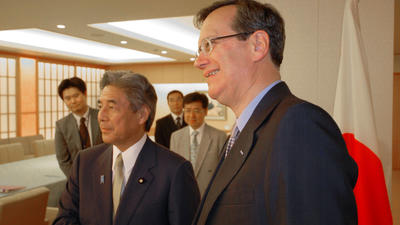-
Our work
-
Fields of work
- Arms control
- Border management
- Combating trafficking in human beings
- Conflict prevention and resolution
- Countering terrorism
- Cyber/ICT Security
- Democratization
- Economic activities
- Education
- Elections
- Environmental activities
- Gender equality
- Good governance
- Human rights
- Media freedom and development
- Migration
- National minority issues
- Policing
- Reform and co-operation in the security sector
- Roma and Sinti
- Rule of law
- Tolerance and non-discrimination
- Youth
- Field operations
- Projects
-
Meetings and conferences
- Summit meetings
- Review Conferences
- Ministerial Council meetings
- Plenary meetings of the Permanent Council
- Plenary Meetings of the Forum for Security Co-operation
- Security Review Conferences
- Annual Implementation Assessment Meetings
- Economic and Environmental Forum
- Economic and Environmental Dimension Implementation Meetings
- Human rights meetings
- Media conferences
- Cyber/ICT security conferences
- Conference of the Alliance against Trafficking in Persons
- Gender equality conferences
- Annual OSCE Mediterranean conferences
- Annual OSCE Asian conferences
- Partnerships
-
Fields of work
-
Countries
- All
-
Participating States
- Albania
- Andorra
- Armenia
- Austria
- Azerbaijan
- Belgium
- Belarus
- Bosnia and Herzegovina
- Bulgaria
- Canada
- Croatia
- Cyprus
- Czechia
- Denmark
- Estonia
- Finland
- France
- Georgia
- Germany
- Greece
- Holy See
- Hungary
- Iceland
- Ireland
- Italy
- Kazakhstan
- Kyrgyzstan
- Latvia
- Liechtenstein
- Lithuania
- Luxembourg
- Malta
- Moldova
- Monaco
- Mongolia
- Montenegro
- The Netherlands
- North Macedonia
- Norway
- Poland
- Portugal
- Romania
- Russian Federation
- San Marino
- Serbia
- Slovakia
- Slovenia
- Spain
- Sweden
- Switzerland – OSCE Chairpersonship 2026
- Tajikistan
- Türkiye
- Turkmenistan
- Ukraine
- United Kingdom
- United States of America
- Uzbekistan
- Asian Partners for Co-operation
- Mediterranean Partners for Co-operation
-
Structures and institutions
- Chairpersonship
-
Secretariat
- Secretary General
- Office of the Secretary General
- Conflict Prevention Centre
- Transnational Threats Department
- Office of the Special Representative and Co-ordinator for Combating Trafficking in Human Beings
- Office of the Co-ordinator of OSCE Economic and Environmental Activities
- Gender Issues Programme
- Opportunities for Youth
- Department of Human Resources
- Department of Management and Finance
- Office of Internal Oversight
- Documentation Centre in Prague
- Institutions
-
Field operations
- Presence in Albania
- Centre in Ashgabat
- Programme Office in Astana
- Programme Office in Bishkek
- Mission to Bosnia and Herzegovina
- Programme Office in Dushanbe
- Mission in Kosovo
- Mission to Moldova
- Mission to Montenegro
- Mission to Serbia
- Mission to Skopje
- Project Co-ordinator in Uzbekistan
- Closed field activities
- Parliamentary Assembly
- Court of Conciliation and Arbitration
- Organizational structure
- About us
Press release
OSCE-Japan Conference focuses on security challenges

- Date:
- Place:
- TOKYO
- Source:
- Asian Partners for Co-operation, Partners for Co-operation
TOKYO, 10 June 2009 - Participants in an OSCE-Japan conference starting in Tokyo today discussed how the 56 OSCE participating States and its Asian Partners for Co-operation can best co-operate to address global security challenges.
The two-day meeting, organized jointly by the OSCE and Japan's Foreign Ministry, looks at how the countries can share knowledge and experiences to promote security. The Asian Partners are: Japan, South Korea, Thailand, Afghanistan and Mongolia. The Organization also has six Mediterranean partner countries.
In his welcome address, Japanese Foreign Minister Hirofumi Nakasone noted that the OSCE "is a pioneer that has been engaged in comprehensive security, encompassing the politico-military, economic and environmental and human dimensions of security", adding that Asia can learn lessons from European post-war history.
"Today's security of the OSCE is not just from Vancouver to Vladivostok anymore, but is indivisible from security in the entire world," he said.
Theodore Kotsonis, Personal Representative of the Chairperson-in-Office for the Asian Partners for Co-operation, said Greece had made enhancing co-operation with the OSCE Partner countries a priority, to which his own appointment by the Chairperson, Greek Foreign Minister Dora Bakoyannis, was testimony.
"In today's globalized and interdependent world, security in the OSCE is even more evidently closely linked with the broader context of world security," he said, adding this was a reason why the Greek Chairmanship kept engagement with Afghanistan high on the OSCE agenda. "The deployment by the OSCE of an election support team to Afghanistan for the upcoming elections embodies the practical spirit of our partnership."
He also said that last month's nuclear test by North Korea represented a "disturbing threat to regional and global stability".
Ambassador Antti Turunen of Finland, who chairs the Asian Contact Group, highlighted the interdependence between the OSCE and Asian Partner countries. "We have much to learn from each other and so much more to gain from close co-operation," he said. "The OSCE experience in confidence-building could be useful in consolidating the security situation and looking for ways to tackle security problems in Northeast Asia."
OSCE Secretary General Marc Perrin de Brichambaut said the conference came at a fitting time because it comes at a time with the Organization's gravity is shifting toward Asia.
"The 2010 Chairmanship by Kazakhstan could not come at a better time, and it will bring a reinforced Asian perspective to the security dialogue and joint efforts. This new Asian sensitivity acts also as a reminder that OSCE States face a complex array of external threats, often driven by non-state actors that have an impact both East and West of Vienna," he said, adding that he was referring to "security questions that include the challenge of instability in Afghanistan and Pakistan."